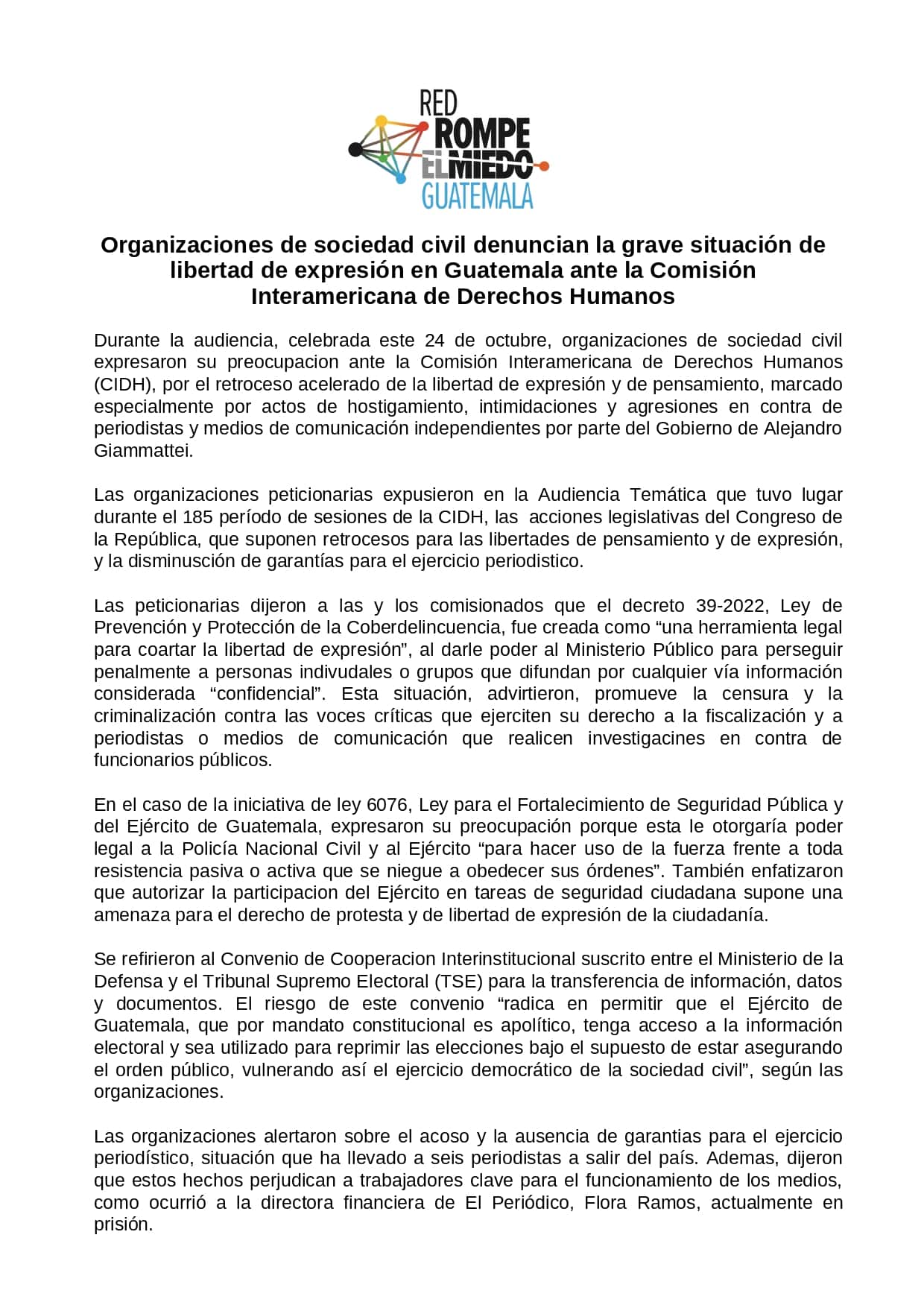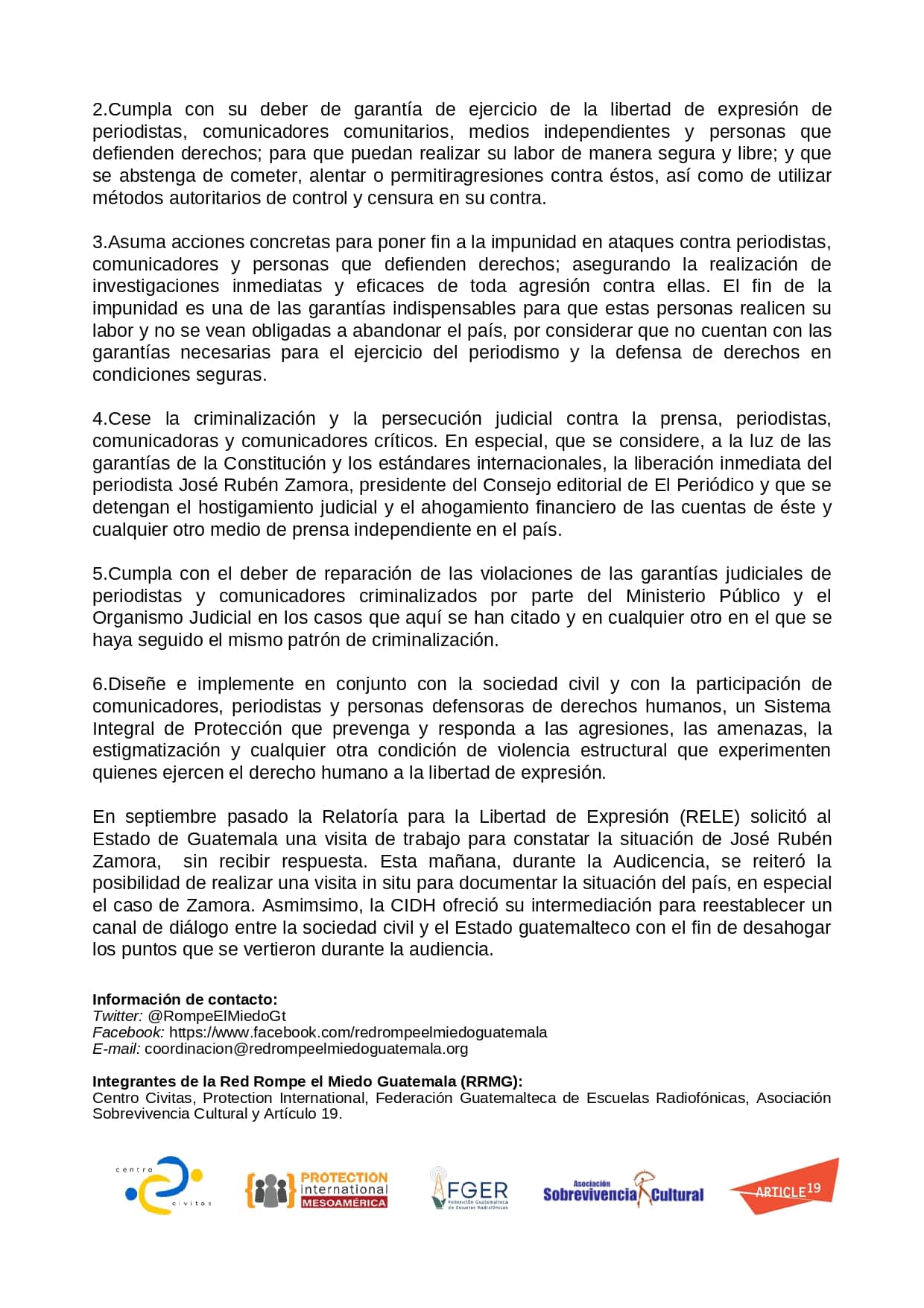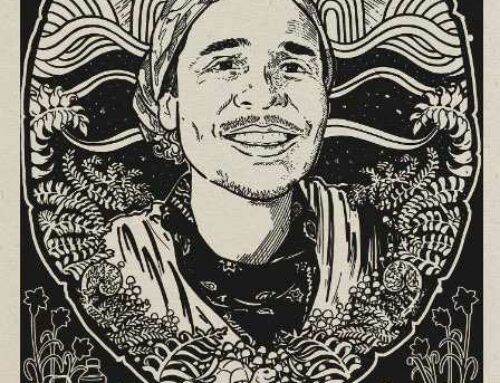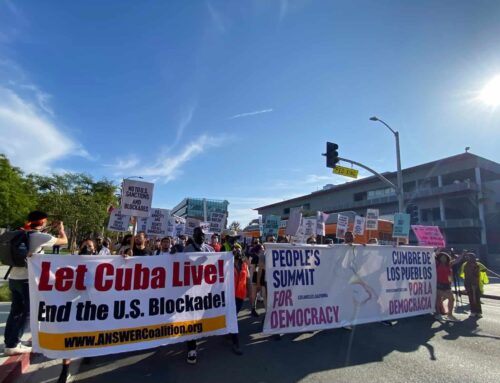Civil society organizations denounce the serious situation of freedom of expression in Guatemala before the Inter-American Commission on Human Rights.
During the hearing, held on October 24, civil society organizations expressed their concern to the expressed their concern before the Inter-American Commission on Human Rights (IACHR) about the accelerated regression of freedom of expression and thought, marked by acts of harassment, intimidation and aggressions against independent journalists and media by the government of Alejandro Giammattei.
The petitioner organizations presented at the Thematic Hearing that took place during the 185th period of sessions of the IACHR, the legislative actions of the Congress of the Republic, which represent setbacks to freedom of thought and expression, and the reduction of guarantees for the practice of journalism.
The petitioners told the commissioners that decree 39-2022, the Law for the Prevention and Protection of Cover Delinquency, was created as “a legal tool to restrict freedom of expression” by empowering the Public Prosecutor’s Office to criminally prosecute individual persons or groups that disseminate by any means information considered “confidential”.
This situation, they warned, promotes censorship and the criminalization of critical voices exercising their right to scrutiny and against journalists or media that conduct investigations against public officials.
In the case of bill 6076, Law for the Strengthening of Public Security and the Army of Guatemala, they expressed concern that it would grant legal power to the National Civil Police and the Army “to use force against any passive or active resistance that refuses to obey their orders”. They also emphasized that authorizing the participation of the Army in citizen security tasks is a threat to the right to protest and to threat to the citizens’ right to protest and freedom of expression.
They referred to the Interinstitutional Cooperation Agreement signed between the Ministry of Defense and the Supreme Electoral Tribunal for the transfer of information, data and documents. The risk of this agreement “lies in allowing the Army of Guatemala, which by constitutional mandate is apolitical, to have access to electoral information and to be used to repress the elections under the assumption that it is ensuring public order, thus violating the public order, thus violating the democratic exercise of civil society,” according to the organizations.
The organizations warned about the harassment and the absence of guarantees for the exercise of journalism, a situation that has led six journalists to leave the country. In addition, they said that these events are detrimental to key workers for the functioning of the media, as happened to the financial director of El Periódico, Flora Ramos, currently in prison.
They also pointed out the seriousness of the situation because personnel from the Public Prosecutor’s Office and the Judicial Organism would be directly involved in the criminalization of journalists because it has been seen with concern that arrest warrants appear on social networks, even in cases under reserve, before the victims have been notified, as occurred in the case of Juan Luis Font, currently outside of Guatemala
They also recalled the “notorious violation of guarantees” against journalist José Rubén Zamora, who has been detained since 29th March of this year and against the journalist Anastasia Mejía Tiriquiz, who was heard in a hearing 35 days later than established by the Constitution, after her detention in September 2020.
During the hearing, the harassment and aggressions against those who carry out investigative work and disseminate information related to the illegal operations of the Coordinadora de Comunidades Afectadas por la Transportadora de Eléctrica de Centroamérica Sociedad Anónima (TRECSA).
In this case, they pointed out the criminalization of five communicators and the attempted murder of a person in 2021, as well as the tapping of cellular devices, loss of information and reprisals against them when they reported these events to the competent authorities.
The petitioners denounced the violations of due process and the serious situation of José Rubén Zamora, president of ElPeriódico, detained for 85 days in solitary confinement, who has been harassed with psychological techniques, the introduction of bedbugs, water cut-offs and unnecessary searches of his cell with guards and aggressive dogs, as well as the denial of information, persecution and harassment of lawyers to obstruct his right to defense.
In addition, they warned about the attacks on ElPeriódico through netcenter who make use of confidential information to which only the Public Prosecutor’s Office and the State, as well as the blocking of three of the media outlet’s bank accounts, despite the fact that a judge has judge lifted their embargo.
The petitioners concluded that the Guatemalan State has failed to comply by action or omission with its duty to respect, protect, and guarantee the exercise of the right to freedom of expression, a situation that encourages violations and abuses by state and non-state actors.
Therefore, they requested the IACHR to urge the State to:
- Review, in light of inter-American human rights standards, the normative framework in force and in process of approval, repealing all those provisions that may infringe on freedom of thought and expression; or limit, restrict and criminalize the work of restrict and criminalize the work of journalists, social and community communicators, and individuals and groups that defend rights. Guatemalan legislation should not discredit discretion or to strengthen the arbitrary use of power by limiting the freedoms of thought, expression, association and demonstration; nor prevent the free exercise of journalism and the defense of human rights.
- Comply with its duty to guarantee the exercise of freedom of expression of journalists, community communicators, independent media and people who defend human rights; so that they can carry out their work in a safe and free manner; and to refrain from committing, encouraging or permitting aggressions against them, as well as from using authoritarian methods of control and censorship against them.
- Take concrete actions to put an end to impunity in attacks against journalists, communicators and people who defend rights; ensuring the realization of immediate and effective investigations of any aggression against them. The end of impunity is one of the indispensable guarantees for these people to carry out their work and not be forced to leave the country because they consider that they do not have the necessary guarantees for the exercise of journalism and the defense of rights in safe conditions.
- Cease the criminalization and judicial persecution against the press, journalists, and critical communicators. In particular, that consideration be given, in the light of the guarantees of the Constitution and international standards, the immediate release of journalist José Rubén Zamora, president of the Editorial Board of El Periódico, and that the judicial harassment and financial strangulation of the accounts of this and any other independent press any other independent press media in the country.
- Comply with the duty to repair the violations of the judicial guarantees of journalists and communicators criminalized by the Public Prosecutor’s Office and the Judicial Organism in the cases cited here and in any other case in which the same pattern of criminalization has been followed.
- Design and implement, in conjunction with civil society and with the participation of communicators, journalists and human rights defenders an Integral Protection System that prevents and responds to aggressions, threats, stigmatization and any other condition of structural violence experienced by those who exercise the human right to freedom of expression.
Last September, the Rapporteurship for Freedom of Expression (RELE) requested the State of Guatemala a working visit to verify the situation of José Rubén Zamora, without receiving a response. This morning, during the hearing, it was reiterated the possibility of an in situ visit to document the situation in the country, especially the case of Zamora.
The IACHR also offered to mediate in order to reestablish a channel of dialogue between civil society and the Guatemalan government in order to address the points made during the points made during the hearing.
Contact information:
Twitter: @RompeElMiedoGt
Facebook: https://www.facebook.com/redrompeelmiedoguatemala
E-mail: coordinacion@redrompeelmiedoguatemala.org
Members of the Red Rompe el Miedo Guatemala (RRMG):
Centro Civitas, Protection International, Federación Guatemalteca de Escuelas Radiofónicas, Asociación Sobrevivencia Cultural and Artículo 19.









Leave A Comment